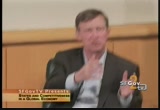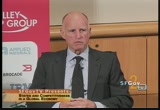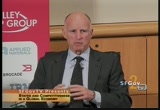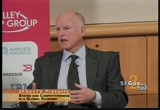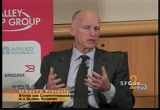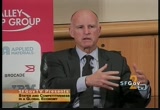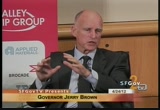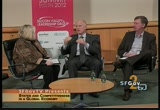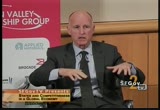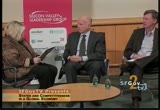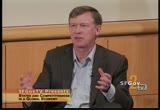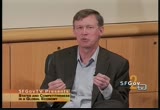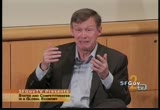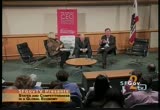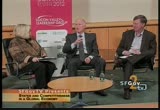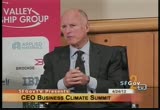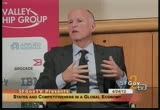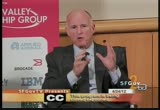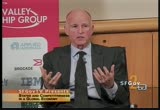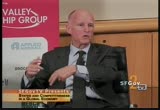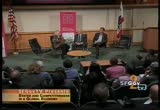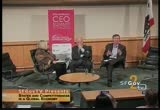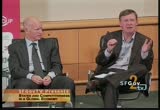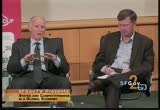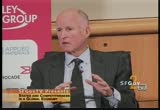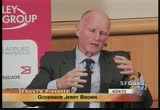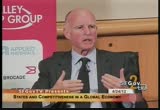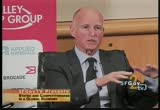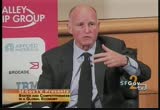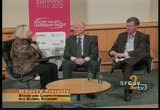tv [untitled] August 31, 2012 6:07pm-6:37pm PDT
6:07 pm
happens and we sat down with halliburton and the oil and gas services companies. we understand they have trade secrets. we showed what the ingredients are and it took a six months but we got the environmental defense fund to claim victory and have halliburton claim victory. here is a transparency, set of regulations that will protect the public and settle down all the hysteria and kirk -- furor about fracking. i did it when i was a kid diyala this. how do we get past that fear and uncertainty and create some sort of predictability to business needs? that became a symbol for our issues. to find the appropriate compromise so we can get on to the next problem. >> would you like to bring us up-to-date on california? maybe give us a sneak preview of the may revise briefly. >> where selling bonds and we're
6:08 pm
not disclosing materials between now and then. we just have to wait. it will be interesting. that i promise you. the basic fact is california increased its production of wealth, the state of 38 million people and all businesses. the economy is somewhat under $2 trillion. there is dynamic wealth creation in many respects. since the time i was last governor, a lot of people and businesses have moved elsewhere or the have died, gone out of business. also, a lot of people have moved here by the millions. we have 38 million people.
6:09 pm
people thought the green was here a and we have -- and we have all kinds of businesses. twitter, google, zynga, it is pretty incredible. what has happened. a lot of things going on. our budget, we have a mess, i inherited a budget deficit of $26 billion. we have cut that substantially. from the mortgage meltdown that occurred because of the bad decisions and this behavior throughout our economy, the revenue in california is up 23%. that is a big number. america, the asset values were destroyed, something like $7 trillion. a lot of that was a bubble. that was popped and resulted --
6:10 pm
we have had to manage a difficult situation. even before the bubble popping, there was excess. because the money flows in in a regular amounts, when money is good, everybody feels good. when $14 billion came in, they thought they were king of the mountain and spend it. arnold came in to clean it up. a couple years later, he left town and $26 billion this year. this has been the nature for the last decade, kicking the can down the road. not talking straight. the way it is. the way it is, it is a tale of two cities. there is fabulous wealth and
6:17 pm
6:18 pm
the real key to that is going to be a local and state government. hopefully the mayor in denver and myself in colorado focusing on how do we create the conditions? we can have brilliant vendors but they can sit on a shelf. you can have all the capital without the right idea -- but without the right idea, how does it improve? the magic there is entrepreneurship. when i was a geologist, i could not find a job and after a while we opened -- i stole the idea from berkeley. we werein the first bgrerew pub. that focus of necessity -- we
6:19 pm
had to do something different. we took it and adapted it. i think that on a much larger scale, we need to find entrepreneurs, people that are willing to put their hearts and souls into that idea, that invention. make sure they have access to capital, and appropriately trained work force, and there is -- government gets out of the way. we need a proper regulation. we have to have it if you are talking about fracking. at that same time, the government has to be a supporter and in every way possible have to limit the burden of red tape or excessive regulation. that is -- that is the message. we are in every community, we have certain tribal leadership. many do give back and recognize it is not all about their narrow self-interest. what are those ways that we can accelerate this international
6:20 pm
job and make sure our grandkids and their grandkids have the same type of tauruses we have? >> if you want to check on the governor's history of innovation, you should google his name and the running of the pigs. [laughter] >> we had the pig farmers and give them the spent grain. they would bring the little oinkers. we would have them run around the block. with all the tv and media. >> google, it is something we have in california. >> i have heard about it. >> governor brown, how did working toward innovation change when you do? >> innovation is no problem.
6:21 pm
it tried to do something that is not conventional and you'll find out it does not look good. i did not get my name governor moonbeam because i was conventional. government is the collection of catch phrases, banalities, and conventionalism. to the extent you depart from that you are stigmatized and reviled. you want to give it an aura of freshness. give it a fresh flavor. that is the essence of political skill. however, -- [applause] i don't rest there. the last time around, we studied emotion.
6:22 pm
ronald reagan said of the bill to -- set up the bill to hire the energy commission. california became the leader in energy efficiency. we put in tax credits and policies of the public utilities commission to favor alternative energy, independent power production. which is obvious today. when they promoted code- generation it was something very novel. 30 years ago. now you have a different name for a period in his third party power production using power in a driving way to recapture the most efficient way. innovation is important. i have to also, every time we heard the word innovation, i have to put a plug in for tradition. i have a very traditional education. i spent a lot of years in silence speaking latin up in the hills, living within the
6:23 pm
medieval framework. i do respect the past. we study it. if you are grounded in tradition, you feel quite confident in change and innovation. if you are insecure, you are very reluctant to embrace the unknown. i do think we need to in our education and politics, we have to have a new appreciation for our traditions and the patterns that describe our culture and our being as americans. having said all that, we have saved in california tens of billions in energy efficiency. when i first adopted those, people reacted negatively. we pushed ahead. and now in california we have ab 32.
6:24 pm
signed by a republican actor turned governor. promoting something i pick up on and promote further. the number of people in silicon valley defended ab23 against -- ab32 against an onslaught of texas oil companies. we defend when they tried to block your business. california gets 50% of the venture capital. there is a lot going on here. we want to promote that. innovation is difficult because by definition, is of the few, not the many. that is the culture we want to encourage both in our schools, by minimizing, not getting overly obsessed with testing, and reducing learning to bubble in a multiple choice response.
6:25 pm
it is not literature, science, innovation, or creativity. it is not innovation. we need rigor and imagination. you need both. you have the left hand and the right hand. we have to combine those things. in california, we create innovation by ab32, but the only state with the cap and trade program, we create it by cutting regulation. i had to fire two incumbent people in our division of conservation. there were blocking oil exploration. i fired them and the oil permits for drilling went up 18%. we have to work on many levels. we're promoting efficiency. we're promoting and renewable energy and climate change -- i
6:26 pm
take courage change very seriously. we have got to do with it and there is a lot of resistance. but we deal with that through enlightened government policies, feedback, and changing them when we find they do not work. and encouraging the private sector where the ideas come up. i do not think -- steve jobs working in his career came up with stuff. i did not know that steve jobs was working in that group on the computer. we want to have space for that. we need space for innovation, it is a constant challenge. the power of the conventional is so overwhelming and the convergence is so powerful that to try to innovate is exhausting in government. let me tell you. in spite of that, i am ready for several more years of
6:27 pm
innovation. i hope you are. i hope california is. [laughter] [applause] >> for this next question, let's pretend that president obama is sitting in this chair. but pretend this is a private room -- let's pretend this is a private room. we need everyone out there to be quiet. if you were here along with the president, what are the two things you would tell him you need to make your state more competitive or all states more competitive? >> i think and i am an unabashed supporter of the president. i do not think all his policies are perfect but he has done a remarkable job of coming into an almost impossible situation in dealing with it as best you can. i can -- would look at the programs that have already embarked on the investment of making sure the government
6:28 pm
supports research at the deepest trouble and is providing not just grants but tax credits. the focus on making sure that we're building a culture of innovation. colorado is the last three years when there were no jobs anywhere, more 25-34 year-old came to call rudder than any other state in the country. -- colorado more than any other state in the country. we want to make sure they are employed in innovative companies that have an opportunity for full education and research. there has to be a culture fun -- from the federal grant all the way down in research. they should hammer out what the appropriate compromise is to repatriate all those overseas profit corporations are not putting back into our or economy. the largest beneficiary would be
6:29 pm
california. we want to see what the cutting edge is. most of a still look for california. -- loomost of us still look to california. what governor brown said about the traditional politics is all about taking the thing in making it fresh. to a certain extent, i tried to be a writer in college. i failed miserably. a professor said everything has been set but not everything has been said superbly. even if it had, everything must be said freshly again and again. you have to see a fresh lead to a certain extent. the real issue with -- in terms of asking the president, what are the things that matter most, a bass part of those profits would be invested in california. colorado would have a significant -- pretty much every state in the country would benefit. you look at the companies based
6:30 pm
in silicon valley. they have offices, you want to expand your business, think about those young people in colorado. everything -- stated say the same thing. that money would get spent over the country very rapidly. >> thank you. governor brown. >> it is a good idea to bring back that $1 trillion sitting out there. how to do that, it remains to be seen. but then that will require some other tax. that would be my big request like everybody else. get america's finances under control and that will take both parties. it will take taxes and it will take reduction in commitments that have been made. it now can be validated. let's get this but do it in a way that exacerbates the
6:31 pm
uncertain economy. the second -- we have to happen through innovation. whether it is the space program or tax credits for renewable energy. all that is important. we have to keep that going. that will get hard because we will face is demographics. that is my 74th birthday on april 7. i am aware of the and aging population which i have become and we are an aging population relative to what we were. luckily, we have millions of fresh arrivals that are younger and are energetic and they come from all over the world. we have to make sure our education system lifts them to
6:32 pm
their highest aspirations. when the society ages, it tends to -- it declines. that is the big demographic imperative. i was reviewing one of my favorite books on the roman republic. how did this village on the tiber grow to be the absolute leader of the known world in a few hundred years? it expanded its territory by plunder, by what ever. details. it was not pretty. [laughter] it added people, it kept getting bigger and incorporated the people and to roman citizenship. it became very consolidated, expanding group of energetic people. and they'll work. they were not just a bunch of
6:33 pm
talkers, they were doing. -- there were doers. -- they were doers. we have to consolidate on this. we have to find the common path that will enable us to make the investments and undergo the sacrifice that is required because it is not all ice cream and cake here. you have to curtail consumption. whether it is a business or household. in terms of -- the free sector. it is still the same game. looking out for the future, saving for tomorrow and investing that savings and. that is what we have to do. i think it is a tough order of this matter of innovation is part of it. but also getting us to come
6:34 pm
together. we can talk about regulation and pension and taxes and the government. a lot of that is [inaudible] a survey said housing prices are too high and that is a negative factor on recruitment. i thought, maybe we can bring the prices down. foreclosure works magic. i do not think you want that. you want rising wealth which could translate into a rising houses -- housing prices. you can increase density and breakdown similar rules, you get more people. there's a lot of things. as i drove down here from oakland cut -- oakland, i saw those cars in the ordinary lanes. one person per car. you have this one person with
6:35 pm
all this steel and plastic and oil. it is ridiculous. we're figuring out ways to do that. whether it is high speed rail or electric cars. the first will be rolling off the factory in treatments in the next few months -- in three months and in the next few months. yes, the innovative companies are small. the electric cars -- the tanks are small but so is fairchild or in tal or hewlett-packard -- intel or hewlett-packard or steve jobs. the seats we plant brings the vast forests of new products and new technologies and new patents in the future. that is where we have to -- we have to keep our eye on the main thought here. that is the discipline, the
6:36 pm
imagination, and the investment. that is what makes california -- that is why people are still coming here. they're not staying in colorado, i am sorry to say. they're right here. [applause] >> just briefly, setting aside plunder for a moment. >> i am sorry about plunder. it is a big part of wealth creation. >> could you talk briefly about your turn initiative? >> it is going well. mike rossi is leading the charge. i have met with what i think will be the next president of china. we have delegations from china to come here. we're sending delegations there. this is not just business as usual. we're getting detailed
276 Views
IN COLLECTIONS
SFGTV2: San Francisco Government Television Television Archive
Television Archive  Television Archive News Search Service
Television Archive News Search Service 
Uploaded by TV Archive on

 Live Music Archive
Live Music Archive Librivox Free Audio
Librivox Free Audio Metropolitan Museum
Metropolitan Museum Cleveland Museum of Art
Cleveland Museum of Art Internet Arcade
Internet Arcade Console Living Room
Console Living Room Books to Borrow
Books to Borrow Open Library
Open Library TV News
TV News Understanding 9/11
Understanding 9/11